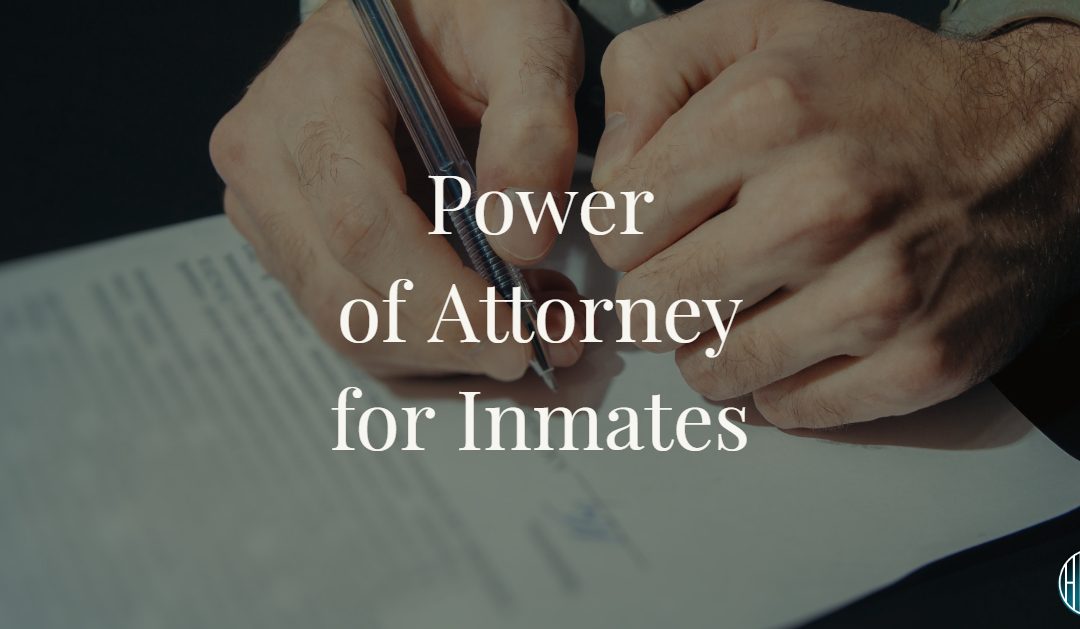Life is full of unexpected events, and sometimes our loved ones make decisions that negatively impact themselves. No matter the circumstances that lead to a loved one’s incarceration, there are ways to protect their personal property, finances, minor children, real estate, and other affairs while they are serving their sentence.
What is a Power of Attorney?
First and foremost, it is important to understand what a Power of Attorney is and why it can be helpful to someone that is incarcerated.
A Power of Attorney is a document that appoints an agent to act on behalf of another person and allows them to make financial decisions and transactions in their absence.
Simply put, a Power of Attorney establishes an agent, someone the principal (the one executing a power of attorney) elects, to conduct their business. It is essential when choosing an agent that it is someone whom the principal trusts with their affairs such as a spouse, close relative, or an adult child.
Whoever is chosen will make decisions for the principal based on the parameters of their Power of Attorney. North Carolina offers a Power of Attorney template; however, while these forms can be useful if there is no other option available. It is important to remember that not every situation is the same, and a cookie-cutter form may not conclusively establish the specific powers you intend to grant your agent.
For example, a principal can give the power to withdraw money from bank accounts, file tax returns, buy and sell the property (real estate and automotive) and pay a principal’s bills, among other things.
Another point to consider is the fact that these forms are legally binding documents, and they are full of legal terminology that can best be interpreted by an estate planning attorney.
Without having a qualified estate planning attorney look over the documents and explain the terminology, it may be challenging to understand what powers are being given to an agent.
A Power of Attorney Can Grant Broad or Limited Authority
A Durable Power of Attorney essentially means that the Power of Attorney remains in effect even if the principal becomes incapacitated. Since the Uniform Power of Attorney Act, effective January 1, 2018, all Powers of Attorney are durable unless expressly stated in the document that the document becomes ineffective at the incapacitation of the principal.
The Importance of Meeting with an Attorney
An attorney can accurately explain the different ways of drafting a Power of Attorney, what a principal’s options are, and how to create a document that best meets the principal’s needs and timeline.
Whoever is executing the document may want to ask questions about their right to revoke a Power of Attorney after it is created. An inmate may not be interested in having a Power of Attorney that never expires because they need someone to handle their affairs while they are incarcerated.
In this case, an inmate may want a temporary Power of Attorney with certain limitations on powers that can be exercised by the agent. Speaking with an estate planning attorney can help an inmate understand what powers they can establish and what powers they can deny in their Power of Attorney.
An attorney can also help squash any fears an inmate may have about giving an agent “unlimited power” to their affairs. An estate planning attorney can offer information regarding things an agent cannot do, such as electing another individual to take over their duty as an agent.
Getting Access to an Attorney While in Prison
via GIPHY
Inmates still have rights when it comes to reasonable access to an attorney, even if it is not an attorney that is representing them for criminal charges.
Each facility has its own rules and regulations when it comes to visitors, including attorneys. If a loved one is currently incarcerated, one can contact the facility to find out what their visitation regulations for estate planning attorneys may be.
From there, it may be up to a family member or friend to find and contact an attorney who visits inmates for the purpose of estate planning. An inmate is allowed visitation with an attorney to discuss the process of creating a Power of Attorney, among other documents, and what the document needs to do to reflect their needs. Afterward, the attorney can draft the documents and prepare them for execution.
A Power of Attorney must be executed in front of a notary public or another individual who is authorized by law to give oaths. An inmate should check with their facility to organize the use of a notary public or like an individual. According to the State of North Carolina Department of Public Safety’s prison policy and procedure, notary services are available to inmates at reasonable times.
While it may be slightly challenging to orchestrate the entire process, it can be done and will ease the inmate’s mind that their personal affairs are being conducted while they are serving their sentence. In federal prisons, there are federal laws that permit certain prison officials to acknowledge signatures and give oaths.
Getting Started With POA While Incarcerated
The attorneys at Hopler, Wilms, & Hanna, PLLC are experienced in drafting Power of Attorney documents and have assisted inmates in the preparation and execution of such documents. If you or your loved one needs a Power of Attorney, contact our office today for assistance.


